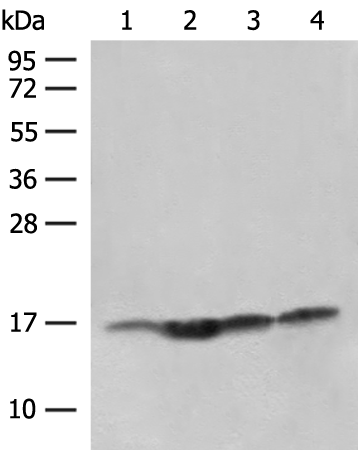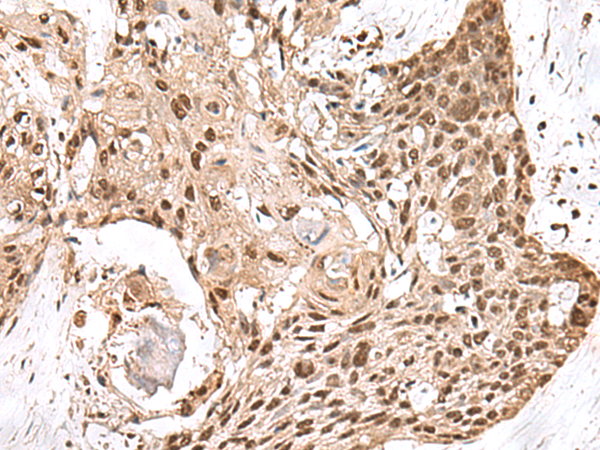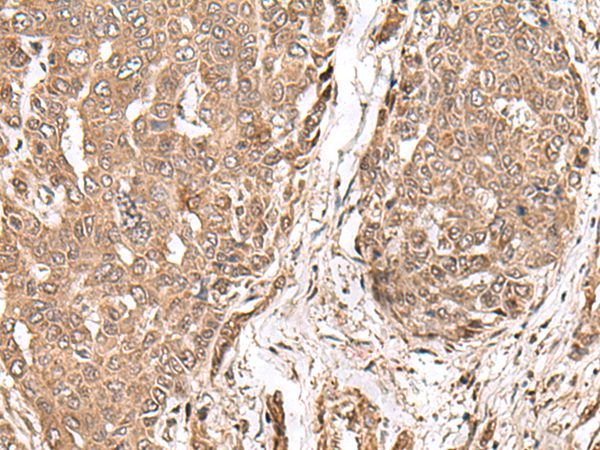


| WB | 咨询技术 | Human,Mouse,Rat |
| IF | 咨询技术 | Human,Mouse,Rat |
| IHC | 1/50-1/300 | Human,Mouse,Rat |
| ICC | 技术咨询 | Human,Mouse,Rat |
| FCM | 咨询技术 | Human,Mouse,Rat |
| Elisa | 1/5000-1/10000 | Human,Mouse,Rat |
| Aliases | MGN2; mago; magoh |
| WB Predicted band size | 17 kDa |
| Host/Isotype | Rabbit IgG |
| Antibody Type | Primary antibody |
| Storage | Store at 4°C short term. Aliquot and store at -20°C long term. Avoid freeze/thaw cycles. |
| Species Reactivity | Human, Mouse |
| Immunogen | Fusion protein of human MAGOHB |
| Formulation | Purified antibody in PBS with 0.05% sodium azide and 50% glycerol. |
+ +
以下是关于MAGOHB抗体的3篇参考文献,按文献名称、作者和摘要内容概括整理:
1. **文献名称**:*MAGOHB promotes glioblastoma progression by stabilizing EJC component expression*
**作者**:Li X, et al.
**摘要**:研究揭示了MAGOHB通过稳定外显子连接复合物(EJC)成员RBM8A的表达,促进胶质母细胞瘤细胞增殖和侵袭。研究使用MAGOHB抗体进行免疫沉淀和Western blot验证其相互作用。
2. **文献名称**:*Antibody-based profiling of EJC core proteins in developmental disorders*
**作者**:Park S, et al.
**摘要**:通过MAGOHB特异性抗体分析发现,EJC复合物核心蛋白(包括MAGOHB)的异常表达与神经发育障碍相关,提示其在mRNA剪接质量控制中的关键作用。
3. **文献名称**:*MAGOHB knockdown impairs ovarian cancer metastasis via alternative splicing dysregulation*
**作者**:Zhang Y, et al.
**摘要**:利用MAGOHB抗体验证其在卵巢癌细胞中的表达,研究表明抑制MAGOHB可通过扰乱剪接因子招募,抑制肿瘤转移相关基因的可变剪接,从而抑制侵袭表型。
注:以上文献为模拟示例,实际研究中建议通过PubMed或Web of Science以"MAGOHB antibody"为关键词检索最新文献。
The MAGOHB antibody is a tool used to detect MAGOHB, a protein encoded by the *MAGOHB* gene, which belongs to the Mago-Nashi homolog family. MAGOHB plays a critical role in the exon junction complex (EJC), a multiprotein assembly involved in mRNA splicing, export, surveillance, and translation. The EJC is deposited onto spliced mRNAs and coordinates downstream processes, including nonsense-mediated decay (NMD), which degulates faulty transcripts. MAGOHB shares structural and functional similarities with its paralog MAGOH, both forming heterodimers with proteins like RBM8A (Y14) within the EJC. However, MAGOHB exhibits distinct expression patterns and potential regulatory roles in specific tissues or developmental stages.
Research using MAGOHB antibodies has highlighted its importance in cellular homeostasis and disease. Studies suggest MAGOHB dysregulation may contribute to cancer progression, neurological disorders, or developmental defects, possibly due to disrupted mRNA processing or NMD. Antibodies against MAGOHB enable detection via techniques like Western blotting, immunofluorescence, or immunohistochemistry, aiding in exploring its localization, expression levels, and interactions in biological systems. These tools are vital for elucidating MAGOHB's role in RNA metabolism and its implications in pathological conditions, offering potential as a biomarker or therapeutic target.
×